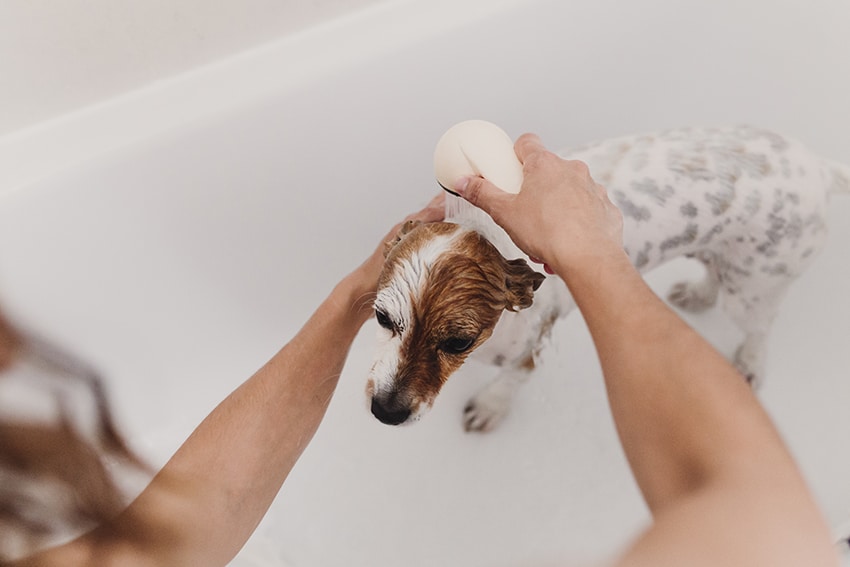As a veterinarian, it’s heartbreaking to see my patients suffering, and this is especially true when I have patients with a nasty skin condition that causes them to chew and scratch so intensely that they start to mutilate their body and lose clumps of hair. These can also be incredibly challenging cases to treat, and are frustrating and distressing for dog paw-rents.
If your pooch is suffering with their skin, I’m sure you’ve been searching high-and-low for a solution to alleviate their pain and distress. A quick google search can reveal so many conflicting answers to these so my best advice is to have a chat with your veterinarian who will always have your dog’s best interest at heart.
One treatment or management option is to use medicated shampoo on your dog and there is a huge variety on the market. Some shampoos that are marketed as medicated may not contain a drug and instead contain a blend of skin-soothing ingredients that help to ease your dog’s pain. In this article, we will focus on those that specifically contain medications such as salicylic acid, chlorhexidine, etc.
So let’s explore medicated dog shampoos and find out how they work…
What is Medicated Dog Shampoo?
Medicated shampoos are designed to target specific skin conditions that affect our best fur-iends. These shampoos generally don’t contain detergents and shouldn’t be expected to clean a mucky pup’s coat. Broadly, there are two types of medicated shampoos: over-the-counter “medicated” shampoos and prescription shampoos. Prescription shampoos tend to be stronger and are designed for specific skin conditions.
Medicated shampoos should ideally be used on already cleansed dog coats as they don’t usually contain soap or detergents. Prescription shampoos have been formulated to specially treat and manage a specific skin condition.
How does medicated dog shampoo work?
Medicated shampoos work in a range of different ways depending on their target condition. For example, a medicated dog shampoo designed to soothe itching will contain ingredients such as aloe vera and most require a contact time of up to 10 minutes before rinsing to achieve maximal results. Unlike cleansing shampoos that remove dirt immediately, you generally won’t see much improvement for a few weeks.
Medicated shampoos target both the cause of the condition (parasite, fungus etc) and also the reaction that your dog’s immune system has to it (intense itching and redness).
Medicated Shampoo vs Regular Shampoo: What’s the difference?
So, why should you bother choosing a medicated shampoo over a regular one? If your pooch is out rolling in fox poop and picking up the most disgusting things you can imagine without flinching then you probably won’t need a medicated shampoo much in their life. If however, you have a more “delicate daisy” doggy that only has to look at a flea to develop an intensely itchy rash then you are likely to find medicated shampoos to be a staple in your bathtime kit.
The top difference between a medicated and regular shampoo is detergents. Regular shampoos are designed to cleanse your pooch, remove dirt and grease and maybe even detangle long-haired furballs. Medicated shampoos on the other hand don’t usually contain soaps or cleansing detergents and so should ideally be used on already clean fur for best results.
Regular shampoos tend to also contain fragrances and some may contain skin-soothing ingredients such as aloe vera while a medicated shampoo will generally not contain any extraneous fragrances or anything that could irritate delicate and damaged skin even further.
The other big difference between these shampoos is the specialized ingredients in medicated products. Depending on what condition the medicated shampoo is targeting, it will contain specific medications such as permethrin to manage flea infestations. Prescription shampoos may contain antibiotics too.
The big differences between medicated and regular shampoos are the addition of medications and the elimination of detergents and fragrances to prevent further irritation of already damaged skin. Regular shampoos are best for thoroughly cleaning your mucky pup after a good roll in something stinky.
Medicated Dog Shampoo Types
So far you’ve probably noticed the frequent “medicated” term in this article, but now, let’s have a look through some of the specific medicated shampoo types. Just like many other products, one size does not fit all cases. You may see some shampoos claim to target “hot spots” or “hair-loss” but these are actually just signs of an underlying problem. dogs with a localized bacterial infection may develop a “hot-spot” so remember it’s not the actual issue, it’s just a symptom. The broad categories for medicated shampoos are listed below, I’ve also included some over-the-counter shampoos that I recommend for my patients.
General Allergies/Irritated Skin
- Pooches with environmental skin allergies can be so intensely itchy the can actually chew their skin to the point of bleeding. Medicated shampoos for these dogs need to both help remove the allergens that trigger the itching and also soothe the raw skin.
- Veterinary Formula Clinical Care Antiparasitic and Antiseborrheic Medicated Dog Shampoo
Fungal Infections
- The two most common fungal infections I see in my patients are ringworm and Malassezia (yeast) infections. These are incredibly itchy conditions and dog’s often have a characteristic odor when they are suffering with a yeast infection. Medicated shampoos targeting these infections often contain chlorhexidine or an anti-fungal such as ketoconazole.
- Dechra MiconaHex+Triz Shampoo for Dogs and Cats
Dry Skin
- Over-the-counter medicated shampoos aimed at helping pooches with dry, scurfy skin are usually detergent-free and contain soothing and moisturizing ingredients such as vitamin E, oatmeal, chamomile, and aloe vera. Some may contain stronger ingredients such as salicylic acid and zinc gluconate.
- Zesty Paws Itch Soother Dog Shampoo with Oatmeal & Aloe Vera
Bacterial Infections
- While bacterial infections are generally secondary to skin injury, such as a wound or self-trauma due to a flea allergy dermatitis, they can be itchy and problematic in themselves. Pooches suffering with a bacterial skin infection may need oral antibiotics as well as a medicated shampoo to cure the issue and restore healthy skin. Topical treatments in the form of shampoos have the extra benefit of soothing irritated skin to help reduce your pooch’s scratching and chewing at the area.
- Veterinary Formula Clinical Care Antiseptic and Antifungal Shampoo
Parasite Infestations
- Medicated shampoos targeting parasite infestations are arguably the most common medicated shampoos on the market. These are available both over-the-counter and on prescription and primarily target the actual parasites, usually fleas and ticks, and mange to a lesser degree. Pyrethrins and permethrin are possibly the most commonly used ingredients while some of these will also include skin-soothing ingredients such as oatmeal, cucumber, and camomile.
- Advantage Flea and Tick Treatment Shampoo for Dogs and Puppies
The ultimate goal of all medicated shampoos is to treat the inciting cause of the problem, while also soothing your fur-baby’s skin and allowing it to heal fully.
Can medicated dog shampoo cause itching?
Medicated shampoos shouldn’t cause irritation and itching in dogs without a skin condition, however, some ingredients can lead to tingling and a desire to scratch in the immediate post-washing period for your pooch. This is most commonly due to the massaging action and contact with already irritated skin and should rapidly ease.
Skin-soothing, medicated shampoos are specifically formulated to alleviate irritation and thus doesn’t contain ingredients that are likely to make your dog’s skin condition worse. Of course, it’s possible for your dog to be allergic to a shampoo so you should read the ingredients carefully and discuss any concerns you may have with your veterinarian.
Medicated shampoos don’t cause irritation or itching in dogs, however, some of my clients do report increased redness immediately after a bath but this is normal due to increased circulation to the skin following a skin-soothing bath.
How long does it take for a medicated dog shampoo to work?
Unlike a regular shampoo that can have your muddy pup smelling like roses immediately after a bath, a medicated shampoo will generally require a couple of weeks to see the full effect. This is generally due to the fact that most are formulated to soothe and treat already irritated skin which isn’t a fast-fix.
The one exception to this is really the anti-parasitic shampoos that can directly affect the nervous systems of fleas and ticks and also lice and mange which helps to reduce the bug burden on your pooch.
The most important thing to remember about using medicated shampoos is that a single-use won’t generally resolve the issue. Instead medicated shampoos require a number of baths in order to see significant improvement in your dog’s condition.
Do I need a prescription to get a medicated dog shampoo?
Not all medicated shampoos require a prescription, and many dog stores and veterinarian offices will stock over-the-counter medicated shampoos for a range of skin ailments. Some conditions however will likely require a prescription shampoo, for example, ringworm in puppies or elderly pooches often needs a strong anti-fungal shampoo that can only be obtained on prescription.
Some medicated shampoos are available without a prescription, but if your pooch is suffering with a severe case of skin infection or parasites they may need a prescription-only shampoo that contains specific, concentrated doses of medications.
The Final Woof
Medicated shampoos are an excellent tool in our arsenal against painful and pruritic (itchy) skin conditions in our precious dogs. Skin diseases are possibly some of the most distressing and challenging afflictions facing puppers, their paw-rents and DVMs. Treatment for these conditions is generally multi-modal and topical shampoos and ointments are definitely an important management method for my patients.
Not all medicated shampoos require a prescription and often dog owners may find that once their dog’s skin issue is under control that its health can be maintained using over-the-counter shampoo products. As a veterinarian, I generally only advise a prescription-only product in severe cases that stronger concentrations or medications are needed.


